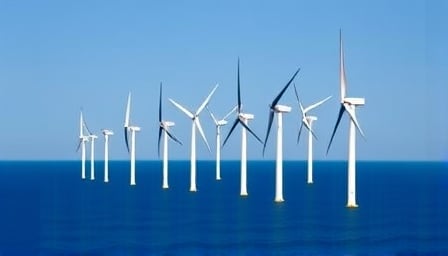Orsted AS: Navigating Turbulent Waters Amidst Political Headwinds
In a dramatic turn of events, Orsted AS, a leading player in the renewable energy sector, finds itself at the epicenter of a political storm that threatens to derail its ambitious expansion plans in the United States. The Danish energy giant, renowned for its pioneering work in offshore wind farms, bioenergy, and waste-to-energy solutions, is grappling with the fallout from the Trump administration’s staunch opposition to wind energy projects.
A Political Blow to Renewable Ambitions
The recent decision by the Bureau of Ocean Energy Management (BOEM) to halt activities on Orsted’s Revolution Wind project off the coast of Rhode Island has sent shockwaves through the company and its investors. This move, part of a broader campaign by the Trump administration to curb renewable energy investments, has not only cast a shadow over Orsted’s operations in the U.S. but also raised serious questions about the viability of its proposed $9.4 billion stock sale.
Orsted’s shares have plummeted to record lows, reflecting investor anxiety over the company’s future in the U.S. market. The halt on the Revolution Wind project, which was nearing completion, underscores the precarious nature of renewable energy investments in an era of political unpredictability. Analysts are now scrutinizing Orsted’s capital-raising efforts, with some suggesting that the company may face significant hurdles in securing the necessary funds to sustain its growth trajectory.
A Strategic Pivot Amidst Uncertainty
Despite the challenges, Orsted is not standing still. The company is actively seeking to reassure its shareholders and stakeholders, emphasizing its resilience and adaptability in the face of adversity. In a strategic move, Orsted has announced the sale of a majority stake in its floating wind project in Scotland, signaling a potential shift in focus towards markets with more favorable regulatory environments.
Moreover, Orsted’s collaboration with the University of Oxford to optimize the design of foundation structures for offshore wind turbines highlights its commitment to innovation and technological advancement. This partnership could prove pivotal in enhancing the efficiency and cost-effectiveness of offshore wind projects, thereby strengthening Orsted’s competitive edge in the global market.
The Broader Implications for the Renewable Energy Sector
The challenges faced by Orsted are emblematic of the broader struggles confronting the renewable energy sector in the current political climate. The Trump administration’s aversion to wind energy, characterized by unfounded claims about its impact on wildlife and human health, poses a significant threat to the industry’s growth prospects in the U.S.
However, the resilience of companies like Orsted serves as a testament to the enduring appeal and necessity of renewable energy. As the world grapples with the urgent need to transition to cleaner energy sources, the setbacks faced by Orsted may ultimately galvanize support for renewable energy initiatives, both domestically and internationally.
Conclusion: A Test of Resilience and Vision
Orsted’s journey through these turbulent times is a litmus test for the renewable energy sector’s ability to navigate political headwinds and emerge stronger. The company’s strategic pivots, coupled with its unwavering commitment to innovation, underscore its potential to not only weather the storm but also to lead the charge towards a sustainable energy future.
As Orsted seeks to calm investor nerves and recalibrate its strategy, the eyes of the world will be watching. The outcome of this saga will not only shape the future of Orsted but also signal the resilience of the renewable energy sector in the face of political adversity.
